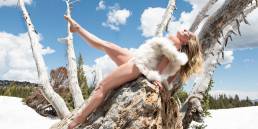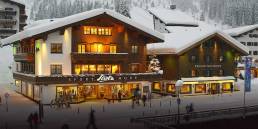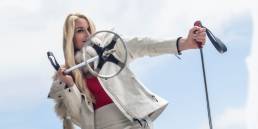Even for those who don’t follow ski racing – a wintry world of high-tech science and hell-raising bravado – The Shiffrin Sensation will be a familiar one. Celebrity status, a rare occurrence for a non-Austrian skier, has been achieved. In the past year alone, Colorado’s Mikaela Shiffrin was named one of TIME’s 100 Most Influential People, won Best Female Athlete at the ESPYs, and made countless appearances on breakfast TV panels and late-night talk show sofas. She has also been awarded, over the seasons, a museum’s worth of trophies and what amounts to a small herd of reindeer, happily homed in Finnish Lapland.
Why? How?
In the spring of 2023, the burgeoning Mikaela went into full bloom, entering the history books as the greatest skier of all time, with an 87th World Cup win – the most top-podiums of any ski racer, anywhere, anyhow. It’s a glittering achievement that crowns a galaxy of others – double-Olympic champion, seven-time World Champion, and that awkward but bang-on superlative, the winningest skier of all time. That record-breaking slalom came two days before her 28th birthday, with a lashing of geographical karma to boot: she managed to burn past Ingemar Stenmark’s record of 86 World Cup wins in his very own Scando backyard of Are, Sweden. Head-shakingly talented, disciplined as hell, and evidently in her prime, Mikaela Shiffrin is having a golden moment.
But it’s not all merry-making and maquillage. First off, there’s the schedule. Punishing by any measure: six months of racing, October through March, in more than a dozen countries. Nine downhills, eight super-Gs, 10 giant slaloms, and 11 slaloms – a total 38 in all. On top of that Shiffrin is brand ambassador at Atomic, Adidas, Visa, and more. For the 21st-century professional athlete, ski racing is so much more than getting into the gate and going like a proverbial bat.
She is, in effect, a one-woman global enterprise. There are the mountains of equipment. The long, tiring journeys by car, bus and plane. Testing waxes, developing skis, countless hours training body and mind, inventing the ways and means to go straighter and faster than anyone and everybody – and, critically, circumventing all the hazards that entails. As the great Norwegian explorer Roald Amundsen famously said, “Adventure is just bad planning”.
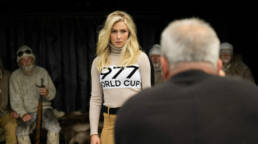
Shortly after her monumental 2023 season ended in Andorra (another GS, another win) and days after the current winter began with early April training in Austria and 4 a.m. wakeup calls, Mikaela flew to Norway, the home of her boyfriend and fellow champion ski racer Aleksander Aamodt Kilde. One more stop for a peripatetic champion.
“You travel far and wide, often for long periods of time, for a particular purpose,” explained Mikaela. “And in the midst of seeking that thing, you find yourself simultaneously experiencing other things you could have never imagined.”
“I am,” she acknowledges, “some form of a modern-day explorer.”
She’s in good company. Consider the possible role models for such an occupation. There’s Columbus, or Marco Polo, Amundsen. And, of course, that famously heroic mapper of the Antarctic, Sir Ernest Shackleton. With many a snowy night under his cavalry-twill belt, he believed any proper explorer should possess four cardinal qualities: optimism, persistence, idealism, and courage.
With the same thoughtful, analytical approach she takes with her skiing, Mikaela considered how well she passes the Shackleton test.
“Optimism doesn’t completely negate the moments of realism, or maybe even negativity. It just means that overall, you must continue with the sense that you can always figure it out, and that there will always be something unimaginably beautiful just around the corner.”
“Persistence is simple: you must never give up. Plans change and people change. Your end goal may change. But you never give up.”
“Idealism is interesting to me. It may be the one thing that I don’t really relate to because I just don’t really have an ideal vision of anything anymore. Every time I imagine anything in my life or future, I always imagine it with some kind of understanding that it might be completely different and completely unideal, and I have to adapt to that as well.”
And lastly, Courage.
“I love that he didn’t say confidence… I think a lot of people confuse confidence with courage. Courage is one of the most important things in my life. It’s simply the willingness to try and keep plugging away despite the chance that you may fail miserably and that may be incredibly painful. It doesn’t mean you are fearless, it means you continue despite your fears.”
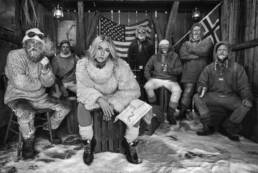
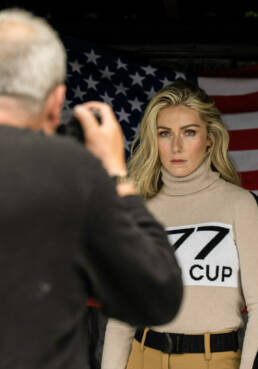
Mikaela’s well-documented courageousness is measured not only in 100ths of seconds. And it’s an attribute not restricted to Downhill courses where speeds exceed 70mph, and her much-analyzed turns create forces of up to 3.5 Gs against her five-foot seven-inch frame. It also takes a certain type of mental muscularity – maybe optimism? – to put your thoughts, your emotions, your self, out there in the public domain. Vide, her slick and successful fly-on-the-wall YouTube Channel shadowing the highs and lows, the tears and belly laughs, of her round-the-world voyage.
With seven episodes in the bag (and more to come), “Moving Right Along” starts by addressing the rock bottom that was her Beijing where, to the surprise of the Olympic watching world, no medals would grace the Shiffrin neck, despite being odds-on favorite to sweep most, if not all, of them.
“Here’s the truth about my biggest and most public fail – falling three times at the Olympics is NOT the worst or hardest thing that I have experienced in my life, it doesn’t even make the podium.”
In February 2020, her season was interrupted by a daughter’s worst horror. Her beloved father, Jeff Shiffrin, had died suddenly at the age of 65. Afterward, she felt it seemed silly to struggle with pre-race jitters. Putting it bluntly, “I don’t really care much anymore.”
“I think realizing that ski racing actually isn’t the “be all, end all” is fairly liberating. It’s something that is very important to me, but I don’t have to put all of the pressure in the world on myself every single race.”
“I can try to enjoy the small moments, take the sport as seriously as I ever did but maybe not take myself so seriously,” she explained of her attitude shift, one that in the end did her results no harm. “It’s basically just realizing that nothing is quite as monumental as you might think it is and when I remember that, it helps me with the performance-anxiety feeling.”
Look closely at the hauntingly beautiful faces that populate the stunning photos by David Yarrow. You don’t have to search long to alight on the luminous eyes of her 30-year-old Norwegian partner Aleksander Aamodt Kilde. With two Olympic medals, 39 World Cup podiums, and packing a gold-plated sense of humor (he’s resigned to being the plus-one when Mikaela’s around), the couple make a formidable team. Inevitably, when two stars such as these collide, a great deal of energy – and interest – erupts. Conducting a relationship amid the pressure of the White Circus can’t be all edelweiss and fresh powder.
“I feel his support and also guidance help me, whether he’s right there with me or on another continent. That’s probably the most incredible thing, that we can somehow feel close to each other and connected even when we are far away.”
“I think it takes a lot of flexibility and honestly simply love. We don’t get to see each other all the time, so when we can be together we really try to take advantage of that time,” she said.
But having eyes for each other doesn’t mean taking eyes off the ball.
“When we are training in the same places we have a great balance of spending time together, doing the job we each have to do as individuals, and also being able to do the job together and help each other in any way we can.”
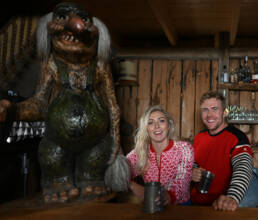
Doing the job.
Mikaela’s training schedule is meticulously drafted and redrafted, together with the rest of her team, to maximize preparation and recovery. “I very rarely race when I feel like I don’t have the tools I need to compete well. If I feel like I’m going into a race series and I’m “not ready” physically for it, then we all figure out together what we need to do in order to be more ready.”
This could mean taking a rest day, finding a different venue for training, pivoting to conditions more suited for the coming event, or changing the training from speed to tech, or vice versa.
“I definitely have some kind of biological athleticism from my parents, especially from my mom. Both my parents were incredible athletes across many different sports – skiing, tennis, Nordic skiing, running, windsurfing, and so many other things – my mom still is. But, in my mind, what was far more important than any role genetics played was their ability to nurture my brother and myself in our sports and passions and help teach and coach us, and at times learn with us,” she explains.
“I learned the importance of work ethic from my parents first,” Mikaela reveals. “And that’s been one of the greatest gifts they’ve given me in life.”
Whatever the origin, her impressive diagnostic skills also set Mikaela apart, one of many puzzle pieces in the astonishing Shiffrin success story.
“I have a pretty strong governor wired into my brain. I remember every time I ever went wrong in skiing, I remember all the injuries and I always analyze what might have led to them. For instance, if a particular crash could have had to do with fatigue or distraction, I always adjust in the future to limit those things.”
“And if push comes to shove and I really don’t feel comfortable, I will take my foot off the gas a bit,” she admits. “But I don’t go past 100 percent in order to win a race. I probably don’t even go past 95 percent.
So much for giving the ole 110 percent. But why would you risk it all, when your 95 per cent is all it takes?
“It’s important to know that anything in life worth doing is going to require some sacrifice. You may not be able to go to the parties your friends go to. You may have to skip gatherings because you need to train or workout or just go to bed at a reasonable time.”
“Sacrifice is part of it,” says the winningest skier of all time. “But I’ve never felt that it wasn’t worth it.”
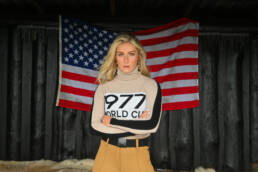
Related Posts
December 11, 2019
Fast Forward-Lindsey Vonn Article & Photoshoot
What Lindsey Vonn has been up to since…


